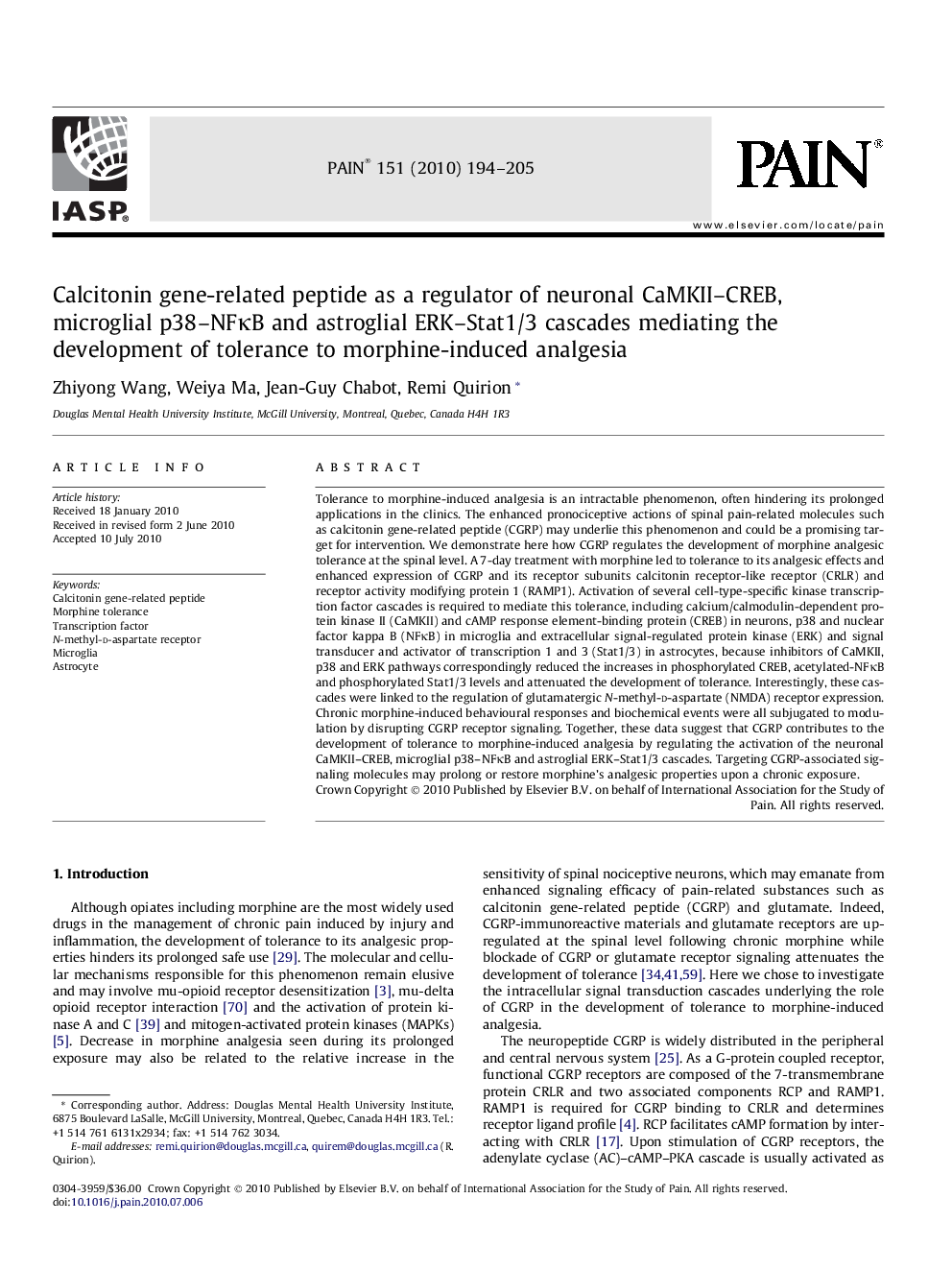| کد مقاله | کد نشریه | سال انتشار | مقاله انگلیسی | نسخه تمام متن |
|---|---|---|---|---|
| 914153 | 918384 | 2010 | 12 صفحه PDF | دانلود رایگان |
عنوان انگلیسی مقاله ISI
Calcitonin gene-related peptide as a regulator of neuronal CaMKII-CREB, microglial p38-NFκB and astroglial ERK-Stat1/3 cascades mediating the development of tolerance to morphine-induced analgesia
دانلود مقاله + سفارش ترجمه
دانلود مقاله ISI انگلیسی
رایگان برای ایرانیان
کلمات کلیدی
موضوعات مرتبط
علوم زیستی و بیوفناوری
علم عصب شناسی
علوم اعصاب سلولی و مولکولی
پیش نمایش صفحه اول مقاله

چکیده انگلیسی
Tolerance to morphine-induced analgesia is an intractable phenomenon, often hindering its prolonged applications in the clinics. The enhanced pronociceptive actions of spinal pain-related molecules such as calcitonin gene-related peptide (CGRP) may underlie this phenomenon and could be a promising target for intervention. We demonstrate here how CGRP regulates the development of morphine analgesic tolerance at the spinal level. A 7-day treatment with morphine led to tolerance to its analgesic effects and enhanced expression of CGRP and its receptor subunits calcitonin receptor-like receptor (CRLR) and receptor activity modifying protein 1 (RAMP1). Activation of several cell-type-specific kinase transcription factor cascades is required to mediate this tolerance, including calcium/calmodulin-dependent protein kinase II (CaMKII) and cAMP response element-binding protein (CREB) in neurons, p38 and nuclear factor kappa B (NFκB) in microglia and extracellular signal-regulated protein kinase (ERK) and signal transducer and activator of transcription 1 and 3 (Stat1/3) in astrocytes, because inhibitors of CaMKII, p38 and ERK pathways correspondingly reduced the increases in phosphorylated CREB, acetylated-NFκB and phosphorylated Stat1/3 levels and attenuated the development of tolerance. Interestingly, these cascades were linked to the regulation of glutamatergic N-methyl-d-aspartate (NMDA) receptor expression. Chronic morphine-induced behavioural responses and biochemical events were all subjugated to modulation by disrupting CGRP receptor signaling. Together, these data suggest that CGRP contributes to the development of tolerance to morphine-induced analgesia by regulating the activation of the neuronal CaMKII-CREB, microglial p38-NFκB and astroglial ERK-Stat1/3 cascades. Targeting CGRP-associated signaling molecules may prolong or restore morphine's analgesic properties upon a chronic exposure.
ناشر
Database: Elsevier - ScienceDirect (ساینس دایرکت)
Journal: PAIN - Volume 151, Issue 1, October 2010, Pages 194-205
Journal: PAIN - Volume 151, Issue 1, October 2010, Pages 194-205
نویسندگان
Zhiyong Wang, Weiya Ma, Jean-Guy Chabot, Remi Quirion,